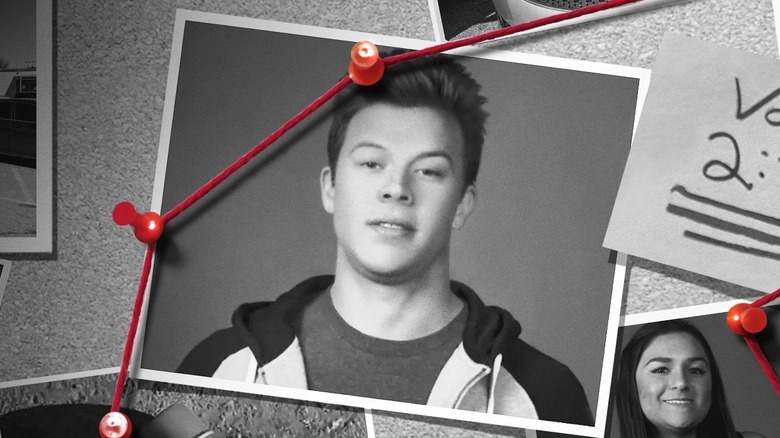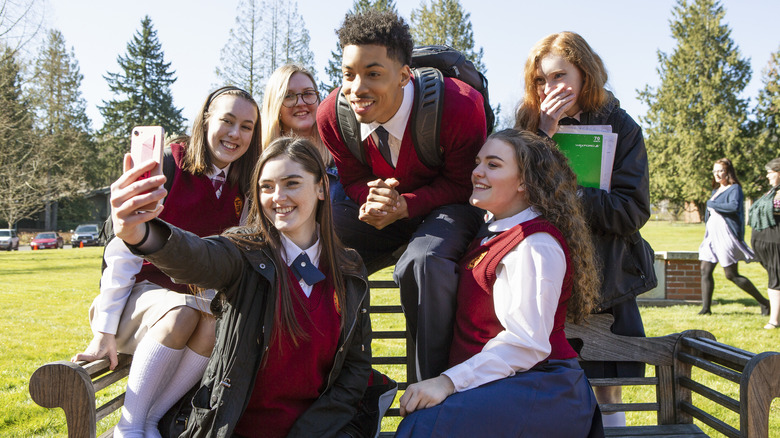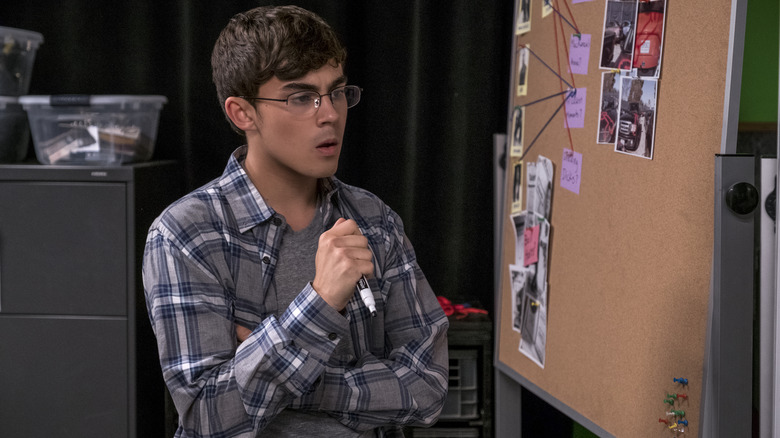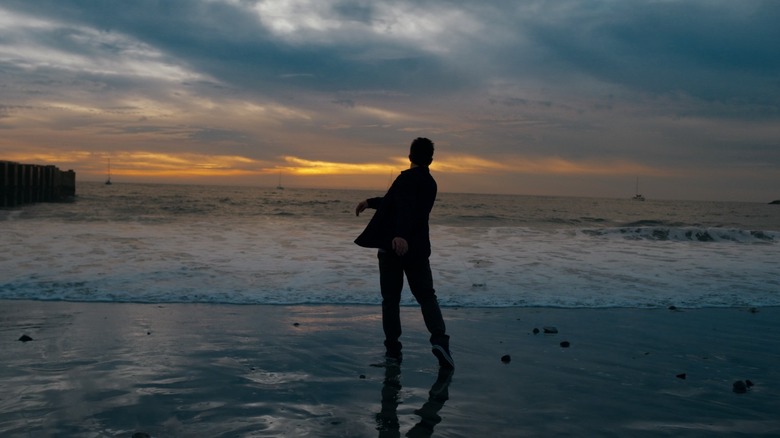TV, Interrupted: The Cancellation Of American Vandal Was A True Crime
(Welcome to TV, Interrupted, a series where the /Film team remembers, eulogizes, and makes a case for the revival of TV shows we loved that were canceled far too soon.)
Netflix learned an important lesson from the mammoth success of "Making a Murderer," and that lesson was that people love murder shows. In the almost 7 years since "Making a Murderer" debuted on the streaming service, Netflix's collection of true crime originals has exploded, expanding beyond the straightforward subject matter of murder mysteries to include stranger hits like "Tiger King," "The Tinder Swindler," and "Don't F**k With Cats."
There have also been more experimental takes on the familiar genre, like "Casting JonBenét," a film that approached the well-documented horror of six-year-old JonBenét Ramsey's still-unsolved murder through the process of auditioning local actors from the Ramseys' home town of Boulder, Colorado, for a reenactment of the murder.
But perhaps the best offering from Netflix's true crime collection is a show that dropped the "true" part entirely. Mockumentary series "American Vandal" was a deft examination of how Gen Z has been shaped by being the first generation to grow up with social media as part of their lives from early childhood. Each of its two seasons boasts some truly nuanced and incisive character studies, alongside one of the most accurate depictions of internet sleuthing I've ever seen on TV.
Not bad for a show about graffiti penises and poop explosions.
Why American Vandal was great
The comedic hook of "American Vandal" — what if there was a true crime docuseries about a really dumb crime, like a teenager spray-painting a bunch of dicks onto cars? — only really has enough mileage for a five-minute parody trailer on YouTube. It would have felt stretched thin after a single episode, never mind a whole season. But the potty humor of "American Vandal" was merely a Trojan horse; the series takes its stories and characters seriously in such a way that the audience can't help but get invested as well. It's no small feat to get viewers genuinely engaged with the mystery of which teacher ate a piece of chocolate-covered cat poop, and that's why "American Vandal" is so impressive.
A lot of TV shows and movies have tried to tangle with modern technology, and what ends up on screen often ends up being either laughably inaccurate or a doom-laden cautionary tale about how social media will kill us all. Another Netflix favorite, "Black Mirror," has been clowned on for repeatedly returning to the "technology = evil" well, with a satirical article by The Toast memorably summarizing the show as "what if phones but too much?"
By contrast, "American Vandal" is genuinely delightful in its use of the internet as a tool for crime-solving (in season 1, high school detectives Peter Maldonado and Sam Ecklund use memes to verify the suggestive undertones of texting "heyy" with two Ys; in season 2, they eliminate suspects by checking their social media posts for a particular glitch that only occurred on iPhones). Many shows are written from the perspective of adults who grew up before the internet was really a thing, and view social media as either shallow and silly, or downright evil. But "American Vandal" sees the beauty in the "fake" versions of themselves that young people post online, observing that these digital self portraits are actually a way of experimenting with identities in the search for one that fits.
Ultimately, what makes "American Vandal" great is its intense compassion for the teens at the heart of its story. In its search for a culprit, it reveals that there are no straightforward bad guys or heroes. The confident, popular kids have their share of deep-seated insecurities. The most beloved and respected teachers have secret pockets of bias and vindictiveness.
"American Vandal" critiques how the true crime documentary genre takes real people and fits them into the roles of villain or hero, protagonist or antagonist, pushing their humanity aside as an inconvenience. When Peter and Sam make segments about each other to examine the possibility that either of them might be the vandal, both end up deeply hurt by having the cold eye of the documentary turned on them. A celebratory moment at the end of season 1 is tainted by a schoolmate cornering Peter and asking him why he felt it necessary to include private text messages revealing her list of hook-ups in the documentary. It had almost no relevance to the investigation; it was simply private information turned into fodder for the content machine.
As Peter concludes in his final monologue for "American Vandal" season 2: "We're not the worst generation; we're just the most exposed."
Why American Vandal was canceled
"American Vandal" was a rare example of a show with a stellar first season whose follow-up season was somehow even better, so the news that season 3 wasn't happening came as a shock.
According to Netflix's own stats, "American Vandal" season 1 was the streamer's #1 most-binged show (by the metric of watching more than two hours a day) of 2017. Both seasons hold a near-perfect score of 98% on Rotten Tomatoes. The show won a Peabody Award and was nominated for a number of other awards, including a Primetime Emmy. It is still one of Netflix's most highly-rated originals, beloved by critics and general audiences alike. So why on earth was it canceled?
Speaking to ComingSoon early this year, "American Vandal" creators Tony Yacenda and Dan Perrault addressed the topic of its cancellation. Perrault credited "American Vandal" as a vital learning experience and said he was "super grateful to Netflix and everyone who gave us that opportunity." Yacenda offered the view that it was a miracle they ever got to make one season of the show, let alone two:
"I think it's a bummer to have something you love canceled, but we also are so grateful for the opportunity. If you describe the premise of that show to anyone, it's crazy that somebody let us make that show in the first place. So I think there were a lot of external market forces that made it possible for that show to be made in 2016. And by 2018, the streaming market was very much changing. But I don't think we could complain about the latter without being very grateful for the former."
Though Netflix has never given an official reason for canceling "American Vandal," Variety's original report of the news in 2018 suggested a partial explanation: while it was distributed on Netflix, "American Vandal" was actually a CBS Television Studios production:
Part of the decision to cancel the series was no doubt because it was produced for Netflix by an outside studio. The streamer, like most in the TV space, is increasingly looking to produce things in-house in an effort to control the global rights to a project.
At around the same time Netflix was also axing other originals from outside studios, such as "Luke Cage" and "Iron Fist." This shift towards in-house productions is presumably what Yacenda means by "the streaming market was very much changing," and was likely the driving force behind the cancellation of "American Vandal."
Will American Vandal ever return?
At first, things looked hopeful. Variety reported that, in the wake of Netflix declining to make "American Vandal" season 3, "an individual with knowledge of the situation said that other platforms have expressed interest in continuing the series."
Unfortunately, that interest has yet to translate into "American Vandal" season 3 getting picked up elsewhere. But Tony Yacenda and Dan Perrault went on to create another mockumentary series, "Players," which debuted on Paramount+ earlier this year. Produced by CBS Studios and a couple of other production companies behind "American Vandal," the show is a parody of sports documentaries with a focus on esports, specifically a "League of Legends" team called Fugitive Gaming. So, while it might not be about potty humor crimes in high schools, "Players" should be the next stop for fans of "American Vandal" who are searching for more shows like it.
As for "American Vandal" season 3 ... well, there's no news on that front. However, it would fit the bill for "in-house" productions at Paramount+, which shares a parent company with CBS Studios, and announcing a new season of "American Vandal" would be a smart move amid the currently raging streaming wars. So I'm holding out hope that we'll see Peter and Sam's investigative skills again some day.



